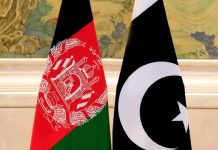ISTANBUL (AFP) – Turkish politicians hold crucial presidential and parliamentary elections that could have a big impact on the future of the NATO member states before the so-called propaganda ban takes effect. A final rally was held at the end of the election campaign on Saturday, the night before the election.
President Recep Tayyip Erdogan, facing the biggest challenge in history in his 20 years in office, addressed three neighborhood rallies in Istanbul, Turkey’s largest city.
His main challenger is the pro-secular center-left CHP (Republican People’s Party) Kemal Kirikdaroglu, co-candidate of the six opposition parties. On Friday, he held his final rally in the capital, Ankara, in torrential rain. On Saturday, he and some of his supporters visited the mausoleum of Mustafa Kemal Ataturk, founder of modern Turkey and CHP.
On Friday, Erdogan dismissed speculation that he wouldn’t cede power if he lost, calling the question “very ridiculous.” In an interview with more than a dozen Turkish broadcasters, Erdogan said he came to power through democracy and would act in line with the democratic process.
“If our nation decides to make such a different decision, we will do exactly what’s required by democracy and there’s nothing else to do,” he said.
Erdogan said Saturday that he viewed the elections as a “celebration of democracy for our country’s future.” He showcased his government’s defense and infrastructure investments and aired videos trying to undermine his opponent as incapable of leading Turkey, while claiming he was colluding with terror groups. He also argued the opposition was pro-LGBTQ and therefore anti-family in a now regular targeting of LGBTQ people in Turkey.
The opposition’s campaign was continued by Istanbul’s popular mayor, Ekrem Imamoglu, who held final rallies in the city to call on people to vote for Kilicdaroglu. As in previous elections, mainstream media coverage of the campaign was spotty, with President Erdogan’s rallies always being broadcast live.
On Friday, Mr. Kilicdaroglu called on tens of thousands of people to listen to his latest speech and vote on Sunday to “change the fate of Turkey.” He said he was ready to bring democracy to Turkey and criticized Erdogan, who in recent years has cracked down on dissidents and centralized much of the state’s power in his own hands.
“I will show the whole world that our beautiful country is a country that can achieve democracy through democratic means,” he said. Although Kirikdaroglu and his party have lost all past presidential and parliamentary elections since taking office in 2010, he has a slight lead over Erdogan, according to polls.
Turkey’s voter turnout has traditionally been high, reflecting the continued belief in this kind of civic participation in a country where freedom of expression and association is stifled. If no presidential candidate receives more than 50% of the vote, a runoff will be held on May 28. Turkey will also elect its 600-seat parliament on Sunday.
Turkey’s top electoral body said votes cast for another presidential candidate, Muharrem Ince, who withdrew from the race this week would count as valid and that he would not be withdrawn until the possibility of a re-vote was considered. announced that it had decided not to Analysts expected Inse voters to switch to Mr. Kirikdaroglu.
Friday, February 20, 2026
More
© London Post, All Rights Reserved by Independent Media Group UK Limited.






